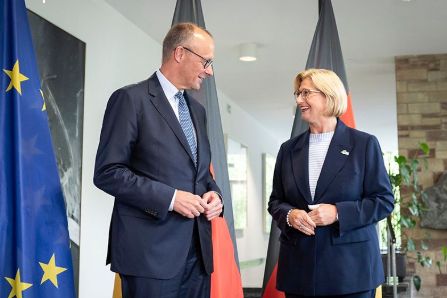German Chancellor Merz emphasizes strategic role of steel industry
by David Fleschen

During his inaugural visit to the federal state of Saarland, German Chancellor Friedrich Merz underscored the continued strategic importance of the domestic steel industry for Germany’s economic resilience and technological sovereignty. Speaking alongside Saarland’s Minister-President Anke Rehlinger, Merz highlighted the need for a reliable national steel strategy and stronger European cooperation in key industrial sectors.
The visit included a stop at the UNESCO World Heritage Site Völklinger Hütte, a former ironworks symbolizing Germany’s industrial heritage and the enduring relevance of steel production. “Germany needs a domestic steel industry – a modern, forward-looking, and ultimately climate-neutral one,” Merz said. “Maintaining steel production in our country is a matter of strategic national interest.”
With rising energy costs, trade tensions with the United States, and broader economic uncertainties weighing on the sector, Merz acknowledged the need for robust political support. “We are currently engaging in dialogue with all major steel regions in Germany to develop a dependable and future-oriented steel strategy,” the Chancellor added.
Minister-President Rehlinger reinforced Saarland’s commitment to its industrial base while adapting to future challenges. "We want to maintain a strong industrial core here in Saarland – not as a relic, but as a foundation for transformation, innovation, and employment,” she stated. She also called for clear trade rules and stronger protections for the European steel market in light of ongoing negotiations between the EU and the United States.
The leaders' joint appearance comes amid growing pressure on the European steel industry to decarbonize while remaining globally competitive. Merz reaffirmed the federal government’s willingness to support green steel initiatives and the development of industrial infrastructure, including competitive energy prices.
In addition to industrial policy, the visit focused on digital innovation and cybersecurity. At the Helmholtz Center for Information Security (CISPA) in Saarbrücken, Merz explored cutting-edge research in AI safety, cryptography, and protection against cyber threats. CISPA scientists demonstrated how large language models can be trained in compliance with data privacy regulations and used to detect digital forgeries (deepfakes) in audio and visual content.
“The research being conducted here is world-class,” Merz remarked after touring the center. “Cybersecurity, IT, and national resilience are tightly linked. What CISPA is developing is not only innovative but vital for Europe’s digital future.”
Both leaders emphasized the need for strong collaboration between Germany’s federal and regional governments in navigating industrial and technological transitions. Merz's visit to Saarland is part of a broader tour across all 16 federal states aimed at strengthening intergovernmental coordination.
Source and Photo: Bundesregierung

